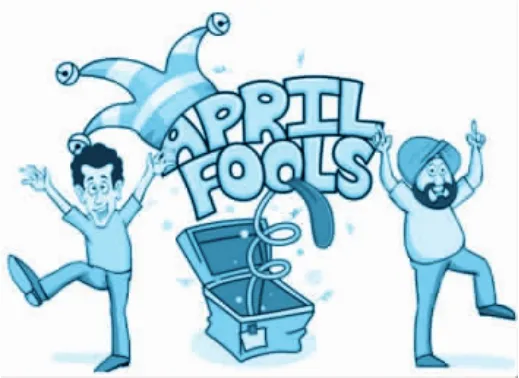April Fool's Day
by Jaime/姜仲華(譯)
□語篇導讀
眾所周知,愚人節是西方的一個傳統節日。這一天,人們可以隨心所欲地玩惡作劇,以此給大家帶來歡樂。可是你知道愚人節發源于哪里嗎?它的發展過程是怎樣的呢?歷史中的愚人節是否有過什么離奇的故事?不同國家的人們又都是怎樣度過愚人節的呢?

April Fool's Day is traditionally a day to play practical jokes on others.No one knows how this holiday began but it was thought to have started in France.
The closest point in time,as the beginning of this tradition,was in 1582,in France.New Year's Day was celebrated on March 25 and celebrations lasted until April 1.When New Year's Day was changed from March 25 to January 1 in the mid-1560's by King Charles IX,there were some people who still celebrated it on April 1 and those people were called April Fools.
Tricks are played on April Fool's Day,such as saying,“Your shoe's untied!”Setting a roommate's alarm clock back an hour is a common trick.And even a British short film once shown on April Fool's Day was about how“spaghetti farmers”harvest their crop from the spaghetti trees.Whatever the trick,the trickster(耍詭計的人)usually ends it by shouting to his victim,“April Fool! ”
April Fool's Day is a“for-fun-only”observance(慣例).Nobody is expected to buy gifts or to take their friends or relatives out to eat in a restaurant.Nobody gets off work or school on this holiday.It's simply a little fun holiday,but a holiday on which one must remain forever vigilant,for he may be the next April Fool!
Each country celebrates April Fool's differently.In France,the April Fool is called“April Fish”.The French fool their friends by taping a paper fish to their friends'backs and when someone discovers a this-trick,they shout,“April Fish”.In England,tricks can be played only in the morning.If a trick is played on you,you are a“noodle”.In Scotland,you are called an“April Gowk”,which is another name for a cuckoo bird.
◆詞語積淀
practical/'pr?ktIkl/adj.實際的;實用的;事實上的
untied/?n'taId/adj.解開的;松開的
harvest/'h?vIst/vt.收獲;收割
victim/'vIktIm/n.受騙者;上當的人;犧牲
vigilant/'vId?Il?nt/adj. 警戒的;警惕的
noodle/'nu?dl/n.傻子;笨蛋;傻瓜
◆典句賞析
1....but it was thought to have started in France.……可是人們認為它起源于法國。
was thought為一般過去時的被動語態形式,該句相當于“It was thought that it had started in France.”;to have started為動詞不定式的完成體,表示動作先于句子謂語動作發生。
【即時嘗試】據報道外星人在地球成功著落。
2....,there were some people who still celebrated it on April 1 and those people were called April Fools.……,有一些人仍然在4月1日慶祝新年,這些人被稱作愚人。
who為關系代詞,用來引導定語從句,修飾先行詞people。句中的who既指代指人的先行詞又作從句的主語,一般可以用關系代詞that來替換;April Fools是主語those people的補足語。
【即時嘗試】在4月1日,被人愚弄的人常被呼作“笨蛋”。
3.Whatever the trick,the trickster(耍詭計的人)usually ends it by shouting to his victim,“April Fool! ”無論這些惡作劇怎樣鬧騰,惡作劇結束時人們通常都要對上當的人大叫一聲“愚人!”。
Whatever the trick是Whatever引導的讓步狀語從句,后面省略了is或may be(該句型中be動詞作謂語時常省略);by doing sth.是固定搭配,表示“通過做某事的方式”。
【即時嘗試】無論題目怎樣,她都會認真思考解答。
譯文助讀
傳統上,愚人節當天人們一般互開玩笑取樂。沒有人知道這個節日是怎么開始的,但是人們普遍認為它起源于法國。
愚人節這一傳統最早可以追溯到1582年的法國。那時人們從3月25日起開始慶祝新年,慶祝活動通常要持續到4月1日結束。在16世紀60年代中期,國王查理九世下令將新年從3月25日更改為1月1日,可是此后還有一些人仍然在4月1日慶祝新年,這些人被稱作愚人。
愚人節當天會上演各式各樣的惡作劇,諸如說,“你的鞋帶松開了”。把室友的鬧鐘撥慢1小時就是常見的惡作劇。甚至曾經在愚人節當天放映的一個英國短片,就是介紹“意大利面條農民”是如何從意大利面條樹上收獲莊稼的。無論這些惡作劇怎樣鬧騰,惡作劇結束時人們通常都要對上當的人大叫一聲“愚人”。
愚人節一直只是個“玩樂”的節日。人們不指望會有誰買禮物或帶親戚、朋友一起去飯店吃飯。在這個節日沒有人不上班或不上課。這只是一個有趣的小節日,可是就在這一天你要時刻保持警覺,說不定你就會是下一個“愚人”。
不同的國家慶祝愚人節的方式不同。在法國,愚人節被稱作“April Fish”。法國人愚弄他們的朋友,就在他們的后背粘貼上一個紙做的魚,當有人發現誰被耍了,就對他大喊一聲“愚人”。在英格蘭,只能在上午玩惡作劇。如果你被別人玩了一個惡作劇,那么你就是一個“傻瓜”。在蘇格蘭,你被叫作“April Gowk”,這是布谷鳥的另一個名字。

